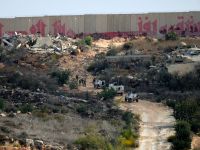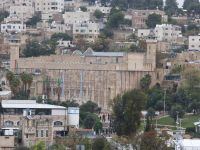Albawaba.com - Amman
Arab member of Knesset Mohammad Barakeh has said that the 10 Arab MKs have agreed to come up with one stand regarding the upcoming Israeli elections, but the basic guideline they have agreed on is that neither Ehud Barak nor his Likud rival Benjamin Netanyahu is an option to the Palestinians in Israel.
He said that the MKs are looking for a third way; they would either support a pro-peace Israeli candidate or nominate an Arab for premiership.
Barakeh did not rule out that other members of the Labor Party might run for the elections, and this would bring about a rift in the party.
According to the MK, difficult times are waiting for the Palestinians, whether the winner was Barak or Netanyahu, but the latter will apply more violent policies in dealing with the Palestinian Intifada.
Q: Following are excerpts from the Interview:
Q: Let us start with Barak’s resignation. Why did he resign? Could you give us an overview of the political situation in Israel?
A: The picture is clear as far as Israeli internal politics are concerned. Barak has been without a majority for five or six months now, and so he has been looking for a coalition. Nevertheless, we cannot look at the political crisis in Israel in isolation from the Palestinian Intifada, which has had its effect on Israeli society. We cannot also overlook the impact of what happened at Camp David, where the Palestinians rejected the Israeli proposals.
These two junctures have reflected on Barak’s policies and the nature of coalition he was seeking. Then there came the bill for dissolving the Knesset. Barak inevitably wanted to choose a timing which would corner his political rivals. He was worried that he would lose the elections for premiership and feared a total collapse of the Labor part at the parliamentary election. By his resignation, Barak preempted that because it automatically meant that there will first be elections for prime minister. This would give him the chance to control the timing and the election war.
Q: There was a meeting for the Likud today (Tuesday) and Netanyahu sounded confident that he would be able to change the law at the Knesset, so that he could run for the premiership. What are his chances for success in that?
A: It is almost an open game, and things are clear. There are certain parties who are not in favor of Knesset dissolution, such as Shas, which is able to swing the vote either way.
In essence, Netanyahu’s address to the meeting was typical of a rightist speech. Both Netanyahu and Sharon talked about “cold peace,” escalating violence against the Palestinian people and canceling all “the concessions made by Barak to the Palestinians at Camp David,” especially those related to Jerusalem, settlements, refugees and sovereignty.
The Israeli public is ready to forget what Netanyahu did a year and a half ago, and he is gaining popularity there.
I think that Netanyahu will not bring change with him, except for more escalation of violence against the Palestinians.
Taking all the circumstances into account, I think Netanyahu will win the elections.
Q: So you believe that Netanyahu can change the electoral law at the Knesset?
A: There are a number of draft laws on the Knesset’s agenda. The first is the bill that calls for abolishing direct election of prime minister, and I think the majority of MKs aare for that amendment.
The second is the draft bill for dissolving the Knesset. Chances are still there, but I think they are weak. The third bill is the so-called “Bibi-Bill” and it has a better chance.
However, the first draft law cannot be applied, if passed, to the elections that will take place after two months.
Q: You talked about the Shas party and its influence on the parliamentary decisions. It seems that they will support Bibi Bill.
A: In fact, it was they who suggested the bill, because this is their way out of new parliamentary elections. What they seek by this is to remove Barak, and at the same time, keep their 17 seats at the Knesset. In case of new elections, they might not win the same number of seats.
Q: What is the role to be played by the Arab members of Knesset. Do you expect, for example, an offer from the Labor party?
A: We have said it publicly that neither Barak, nor Netanyahu or Sharon is an option to us. Therefore, the blocs representing the Palestinians in the Knesset held a meeting today: the Democratic Front for Peace and Equality – which I represent – the United Arab List, the National Democratic Assembly and the Arab Movement for Change.
We agreed that we will take a joint stand towards elections in Israel. We have two ways: either we support an Israeli candidate who is more committed to peace than Barak and Netanyahu. This candidate is to present a new concept in the Israeli political life and convince 750,000 Israeli and Arab voters about himself. We do not want the nomination to be marginal and weak.
The other possibility is to nominate one of the Arab representatives of the Palestinians at the Knesset. Anyway, we agreed at our meeting that we will be studying the prospect for the next few days, and come up with a unified stand.
We will meet next Monday to decide on the different related issues.
I want to underline here that we are not talking of making deals with either Barak or Netanyahu. We have tried this with Barak and we’ve failed.
Barak bombarded our people in the West Bank and Gaza, and killed our sons inside Israel; as long as he will return with a military beret as an arrogant soldier who thinks that disputes can be settled only by force, he will never be an option.
However, if Barak reaches an agreement with the Palestinians, we will not allow ourselves to criticize an agreement signed by the Palestinian leadership.
Q: The Israeli candidate will be from then left wing, won’t he?
A: Yes of course. There is talk over nominating Peres and Uzi Bera’am from the Labor party. There is also the possibility of supporting Yossi Sarid. I think this will render favorable results. Anyway, we will hold on for a week and watch closely over the developments. If such nominations do not work out, we have to find an alternative. The bottom line is that we do not want to be caught between two options: Barak and Netanyahu.
Q: Is the candidacy of Ahmad Tibi an alternative?
A: The decision to nominate Tibi was taken by his party. However, it was wise of Dr. Tibi to announce that he will be committed to any joint position taken by the Arab blocs at the Knesset. Nevertheless, the nomination in itself is a very important political declaration because it highlights our right to be candidates for the prime ministry.
Q: Could we understand that Tibi’s nomination was discussed in the meeting, and overruled?
A: It is agreed that he cannot be a candidate for premiership without the consent of the ten MKs. As I said, we will take decision next Monday after we have an accurate reading of the situation.
Nevertheless, a Knesset member cannot, by law, run for prime ministry unless he is recommended by a bloc or blocs comprising 10 members. There are 10 Arab MKs at the Knesset, and all should consent to the nomination of a candidate.
Q: You mentioned names of potential pro-peace candidates from Labor. Does that mean you expect a rift inside the party?
A: If Uzi Bera’am or [Knesset Speaker Avraham Burg] run for the elections, the Labor will be divided into two camps: the hardliners who support Barak and the pro-peace members who would go for the other candidate. But it should be pointed out here that nothing of the sort has happened in reality. It is still a possibility and things will be clearer by next week.
Q: In case the Arab votes do not go for the Labor, or if Labor itself is split, won’t that lead to a clear victory for Netanyahu?
A: If Netanyahu has 50 percent of the votes, he will win whether Labor runs with one or more candidates. Nevertheless, the emergence of a third element in the equation will jumble the Israeli political map, and the reactions won’t just be between Likud and Labor. In case of a second round of elections, Netanyahu might be facing the third candidate.
Q: In case Peres runs for the premiership, will you set conditions for supporting him?
A: It is unusual for a veteran politician like Perez to throw his gloves in the face of Barak. But if this happened, and negotiations with him took place, we would definitely set our conditions.
Q: Will there be a second round if an Arab candidate runs against Netanyahu?
A: Not necessarily. If Netanyahu wins 50 percent of the votes, he is the prime minister. But if he has to face three or four candidates, his chances will be weaker and that would lead to a second round, were we’ll end up again having to choose between the traditional rivals: Netanyahu and Barak.
Q: Israel has been going through a political crisis for a decade now. What are the prospects of a solution for the crisis, because, as we know, it has its impact on the peace process?
A: We should not look into the crisis in a superficial way, and see it only as a personal conflict of power. In fact, the Palestinian resistance of occupation has had its impact on Israeli politics. The Arab street has also influenced the Palestinian and the US politics.
It should also be noted that the different reactions in Israel between religiously or ethnically conflicting groups is a component of the political crisis.
Q: Back to the meeting of the Arab MKs. You talked about the three items on the Knesset’s agenda. Did you decide for example to vote for Bibi-Bill?
A: We are opposed to Bibi-Bill because we do not intend to give a present to Netanyahu, and the opposition to the draft law is based on a wider democratic concept, that is, a law should not be tailored for a certain person.
Regarding the direct elections, we have already proposed the canceling the law, because it puts the voter in a schizophrenic state. The voter ends up voting for a prime minister he does not support in principle as was the case with Barak in the last elections. People voted for him just to drop Netanyahu, and at the same time voted Likud for the Knesset. We, as Arab voters, cannot give a blank check for a prime minister to rule us for four years. I think this law should be abolished and elections should be done on the basis of parliamentary blocs.
However, not all the Arab MKs are for its abolishment. Ahmad Tibi and Azmi Bishara, for example, are with direct elections of the premier.
We supported the bill concerning early elections in the first reading. We did that to punish Barak and we did, but now the game is different. A dissolution of the parliament and conducting early parliamentary elections is in favor of Netanyahu, and we will stand against it.
Q: The Palestinian people do not seem to see a light at the end of the tunnel whatever the results of the elections are. What are your comments on that?
A: The Palestinians are about to enter a very complicated and difficult stage, whether the winner is Barak or Netanyahu, but things will be worse if the latter becomes prime minister, because he will show more use of violence against the Palestinians than Barak has shown.
But I wouldn’t say that this should be frustrating as far as the Palestinians are concerned. The Palestinians do not acquire their rights from the generosity of the ruling Zionist institution, but through struggle. There is a light in the end of the tunnel; may be it does not show now, but it is there, especially in light of the present Israeli violence. According to the law of life and nature, the Palestinians will win their independence sooner or later and whatever the sacrifices are. If the Palestinians are to be victorious only through more sacrifices, that would be their fate. And I repeat here what the Palestinian poet Tawfiq Zayyad said: The Palestinians may not be the best people on earth, but there is no people on earth better then the Palestinians.
© 2000 Al Bawaba (www.albawaba.com)







